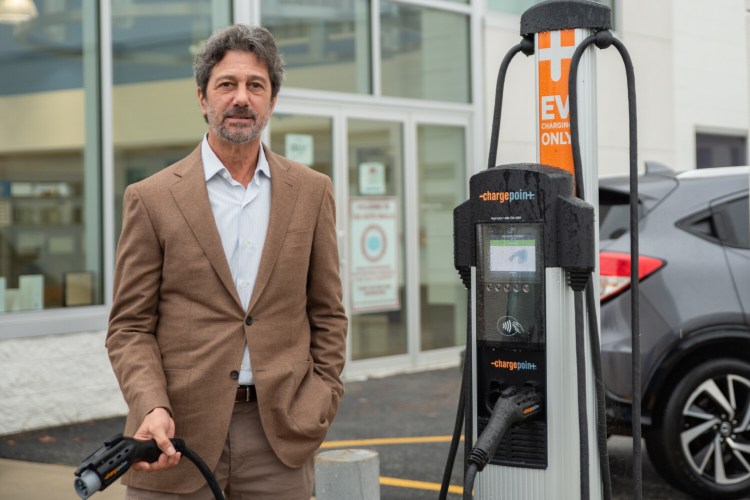AUBURN — As soon as one of those quiet, high-tech electric vehicles lands on the car lot at Lee Auto Mall or Rowe Auburn, “they’re gone. Consumer interest is growing every day,” said Rowe salesman Agazy Abraham.
The inventory of electric cars and plug-in hybrid vehicles is low.
“There is plenty of demand, said Adam Lee, chairman of the board of Lee Auto Malls. “It’s caught people by surprise, there’s no cars.”
The shortage isn’t just electric cars, it’s all inventory because of the global computer chip shortage, Lee said. But all-electric and electric hybrids are hot these days, and the rebates and tax credits that go along with them is just one sign.
Normally for every 100 conventional gas cars “we might have four electric cars, about 4% (on the lot). If you take that 100 down to 10, now you don’t have any electric cars. I have three (Nissan) Leafs coming in the next month. They’re all sold,” said Lee.
To help the environment and use less gasoline, more drivers are considering buying electric. But the computer chip shortage that the auto industry is dealing with means a tight supply, Lee said.
Dealerships expect more electric vehicles and hybrid plug-ins like the new, all-electric Volkswagen ID4 and plug-in hybrid Hyundai Santa Fe will soon arrive. In many cases, customers are ordering them and waiting for the vehicles to arrive, Lee said.
Statewide, all-electric vehicles and plug-in hybrid electric vehicles, which have both electric and gas motors, make up a tiny percentage of vehicles registered in Maine.
According to the Maine Department of Environmental Protection, Maine has nearly 1.2 million vehicles on the roads; electric vehicles make up less than 1%.
That’s changing.
Efficiency Maine projects that within 10 years, one out of every six vehicles registered in Maine will be all-electric or an electric hybrid plug-in.
Since 2015 the number of EVs and PHEVs registered in Maine has grown more than 300%. (Hybrid vehicles without a plug are not considered electric.)
The number of electric vehicles in Maine that use no gas jumped from 553 in 2018 to 1,491 in 2020; the number of plug-in electric vehicles that use electricity or gas climbed from 1,473 to 2,296 during the same two years, according to the DEP.
Also fueling consumer interest are government financial incentives — rebates and tax credits — and national ads, some quite humorous, hitting the airwaves.
Manufacturers are increasing production, said Lynne Cayting, chief of the Mobile Sources Section in the Maine Department of Environmental Protection’s Bureau of Air Quality. “We are going to see a market increase.”
Manufacturers now making EVs or PHEVs include Tesla, Toyota, Ford, Hyundai, Kia, Nissan, Chrysler, Honda, Volkswagen, General Motors, Volvo, Mitsubishi and BMW. More are on the way.
The advantage of a plug-in hybrid is they can go 25 to 40 miles, “on all electric, which for the average person is what you’d drive in a day,” said Lee. “Then they go another 500 more miles on gasoline. That’s a heck of a range. The disadvantage is you’re still burning gas,” he said.
With electric cars that use no gas “you get a range of 250 miles (or more), which for most people is fine most of the time. The advantage is you’re not burning any gas,” Lee said. They can be charged at home, businesses, nonprofit organizations and other locations. “And if you’re driving electric in Maine, charging it up, chances are you’re not using any electricity from coal. It’s clean electricity,” Lee said. That’s confirmed by an EPA web site that allows consumers to enter their EV or PHEV model and ZIP code.
Cayting said the hope is that by 2035, all new vehicles sold will be electric or a mix of electricity and gas, which would create a substantial reduction on pollution. In Maine, 54% of emissions that contribute to climate change comes from transportation, she said. “It’s important for us to transition to electric vehicles.”
Part of transitioning is making sure there are enough public charging stations.
The DEP is conducting a study, with recommendations expected in December, Cayting said, “looking at how do we get there, how do we meet those goals.”
Meanwhile the shortage in vehicles will eventually be resolved when global chip production gets up to speed, Lee said. Recently Toyota announced it is planning to build a chip factory, location not yet known.
Until then, consumers can get the vehicle they want if they’re patient, Lee said. “Call the dealership or make an appointment to come in, tell us what they want,” he said. “We’ll show them different models and put their name on the next one that comes in.”
Send questions/comments to the editors.




Comments are no longer available on this story